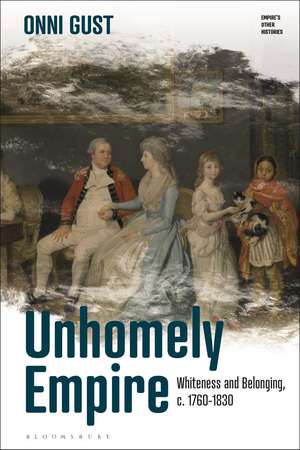Unhomely Empire: Whiteness and Belonging, c.1760-1830: Empire’s Other Histories
Autor Onni Gusten Limba Engleză Paperback – 18 mai 2022
| Toate formatele și edițiile | Preț | Express |
|---|---|---|
| Paperback (1) | 198.05 lei 6-8 săpt. | |
| Bloomsbury Publishing – 18 mai 2022 | 198.05 lei 6-8 săpt. | |
| Hardback (1) | 598.52 lei 6-8 săpt. | |
| Bloomsbury Publishing – 11 noi 2020 | 598.52 lei 6-8 săpt. |
Preț: 198.05 lei
Preț vechi: 258.02 lei
-23% Nou
Puncte Express: 297
Preț estimativ în valută:
37.90€ • 39.70$ • 31.41£
37.90€ • 39.70$ • 31.41£
Carte tipărită la comandă
Livrare economică 09-23 aprilie
Preluare comenzi: 021 569.72.76
Specificații
ISBN-13: 9781350192737
ISBN-10: 1350192732
Pagini: 248
Dimensiuni: 156 x 234 mm
Greutate: 0.35 kg
Editura: Bloomsbury Publishing
Colecția Bloomsbury Academic
Seria Empire’s Other Histories
Locul publicării:London, United Kingdom
ISBN-10: 1350192732
Pagini: 248
Dimensiuni: 156 x 234 mm
Greutate: 0.35 kg
Editura: Bloomsbury Publishing
Colecția Bloomsbury Academic
Seria Empire’s Other Histories
Locul publicării:London, United Kingdom
Caracteristici
Examines the constitutive role of emotion in the history of British imperial expansion
Notă biografică
Onni Gust is Assistant Professor of History at University of Nottingham, UK. A cultural historian of the British Empire in the 'long' 18th century (c. 1730-1830), their work addresses questions of belonging and identity in the eighteenth-century British empire, with a particular interest in the development of ideas of race and gender. They have taught History and Gender Studies at University College London and the London School of Economics, both UK, as well as Amherst College, Smith College, and the University of Massachusetts, USA.
Cuprins
Introduction1. The racialization of belonging in Adam Smith's Theory of Moral Sentiments 2. Dugald Stewart and the colour of progress 3. The role of 'home' in Edgeworth and Graham's critiques of slavery4. Belonging and exile in the debate over Scottish Highland emigration5. Colonial knowledge and the making of white masculinity in Bombay6. 'A hothouse of weeds': reproducing white womanhood in colonial IndiaConclusion
Recenzii
An engaging and elevated analysis ... Prefaced by a well-balanced introduction and concluded with thoughtful contemporary implications of the research, Unhomely Empire is an approachable study for those familiar and those unfamiliar with the topic.
Thought-provoking.
What Gust offers is a powerful account where whiteness intersects with other identities to create a distinctly 'British' identity.
Onni Gust's Unhomely Empire is an exceptionally nuanced and delightfully troubling study of the ideas of belonging and estrangement at the heart of the British imperial experience threading through Scottish Highlands and India of the Company Raj. It brings together intimate questions of domicile, sexuality, and racial difference as key facets of imperial selfhood observed through overlapping lenses of history and biography in ways that have not been attempted before.
Situated at the intersection of histories of Britain and the British Empire, and studiesof the self and racial formation, Unhomely Empire: whiteness and belonging, c.1760-1830 is a deep dive into the Scottish Enlightenment and its lived implications. Bydemonstrating how European imperial expansion, the trans-Atlantic slave trade, andracial thinking informed Scottish Enlightenment ideas of belonging, the book makesimportant contributions to cultural history and the history of imperial networks.
Thought-provoking.
What Gust offers is a powerful account where whiteness intersects with other identities to create a distinctly 'British' identity.
Onni Gust's Unhomely Empire is an exceptionally nuanced and delightfully troubling study of the ideas of belonging and estrangement at the heart of the British imperial experience threading through Scottish Highlands and India of the Company Raj. It brings together intimate questions of domicile, sexuality, and racial difference as key facets of imperial selfhood observed through overlapping lenses of history and biography in ways that have not been attempted before.
Situated at the intersection of histories of Britain and the British Empire, and studiesof the self and racial formation, Unhomely Empire: whiteness and belonging, c.1760-1830 is a deep dive into the Scottish Enlightenment and its lived implications. Bydemonstrating how European imperial expansion, the trans-Atlantic slave trade, andracial thinking informed Scottish Enlightenment ideas of belonging, the book makesimportant contributions to cultural history and the history of imperial networks.











